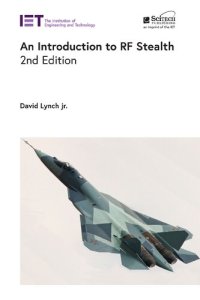
Ebook: An Introduction to RF Stealth (Radar, Sonar and Navigation)
Author: David L. Lynch Jr.
- Year: 2021
- Publisher: Institution of Engineering and Technology
- Edition: 2
- Language: English
- pdf
This expanded, revised and updated new edition of Introduction to RF Stealth covers two major topics: Low Observables and Low Probability of Intercept (LO and LPI) of radars and data links, collectively sometimes called Stealth. Each chapter includes examples, student exercises and references. Worked simulations are available that illustrate the techniques described.
Chapter 1 provides an introduction and history of RF/microwave LPI/LO techniques and some basic LPI/LO equations, expanded from the first edition with more information on new and current systems, including more on infrared and hypersonic missile signatures. Chapter 2 is a new chapter, covering radiation absorbing materials and shaping, focused on materials, meta-materials and detailed platform shaping and structures including ships. Chapter 3 covers interceptability parameters and analysis with corrections, updates and simulations. Chapter 4 covers current and future intercept receivers and some of their limitations with more information and tracking techniques. Chapter 5 surveys exploitation of both the natural and the threat environment with extensive threat table updates including Russian S300, S400, S500 and more information on cellular systems. Chapter 6 deals with LPIS waveforms and pulse compression with new material and simulations of new codes. Chapter 7 introduces some hardware techniques associated with LO/LPIS low sidelobe / cross section antenna and radome design with emphasis on active electronic scan arrays. Chapter 8 is a new chapter on RCS testing of subsystems and platforms.